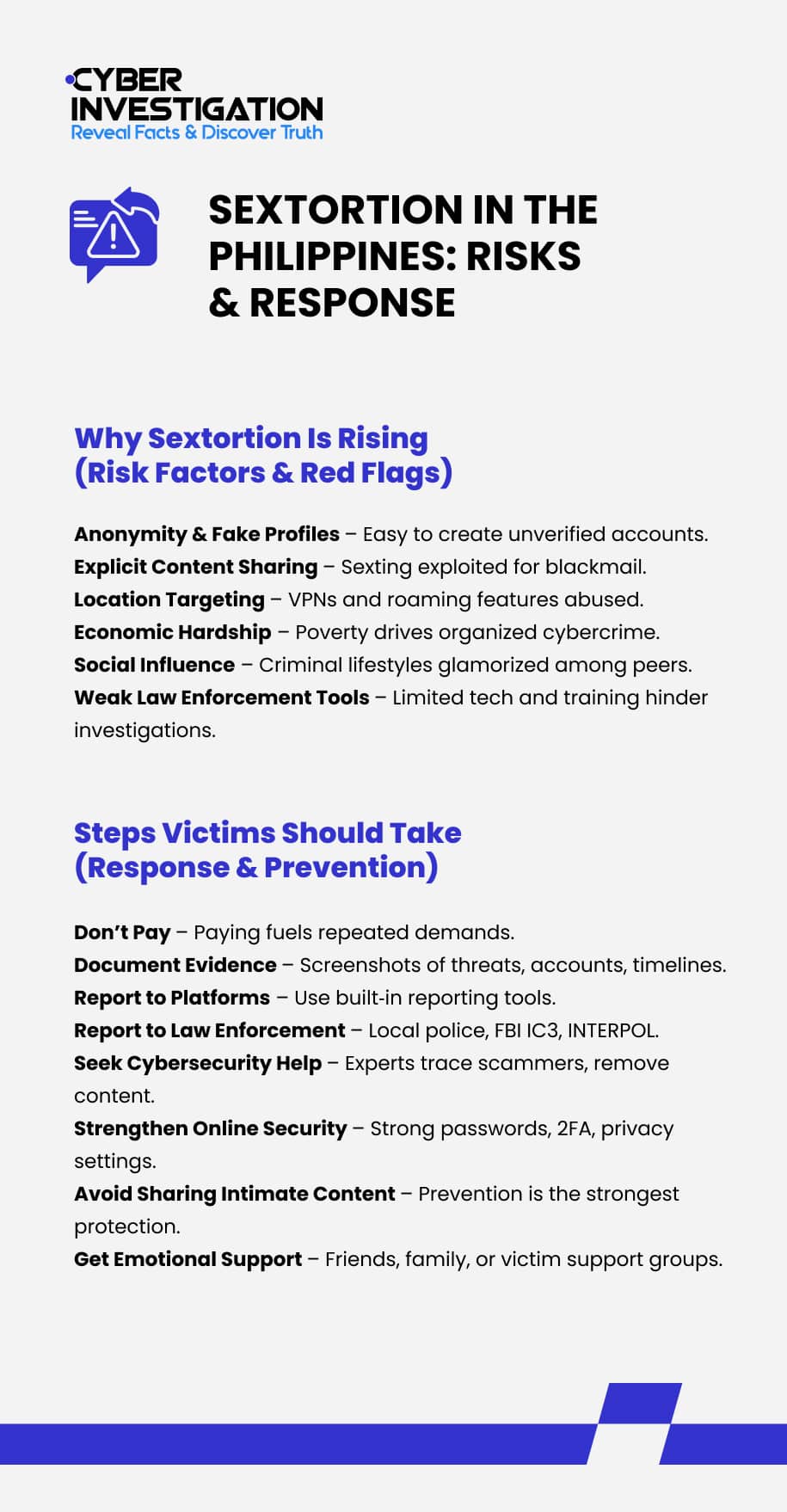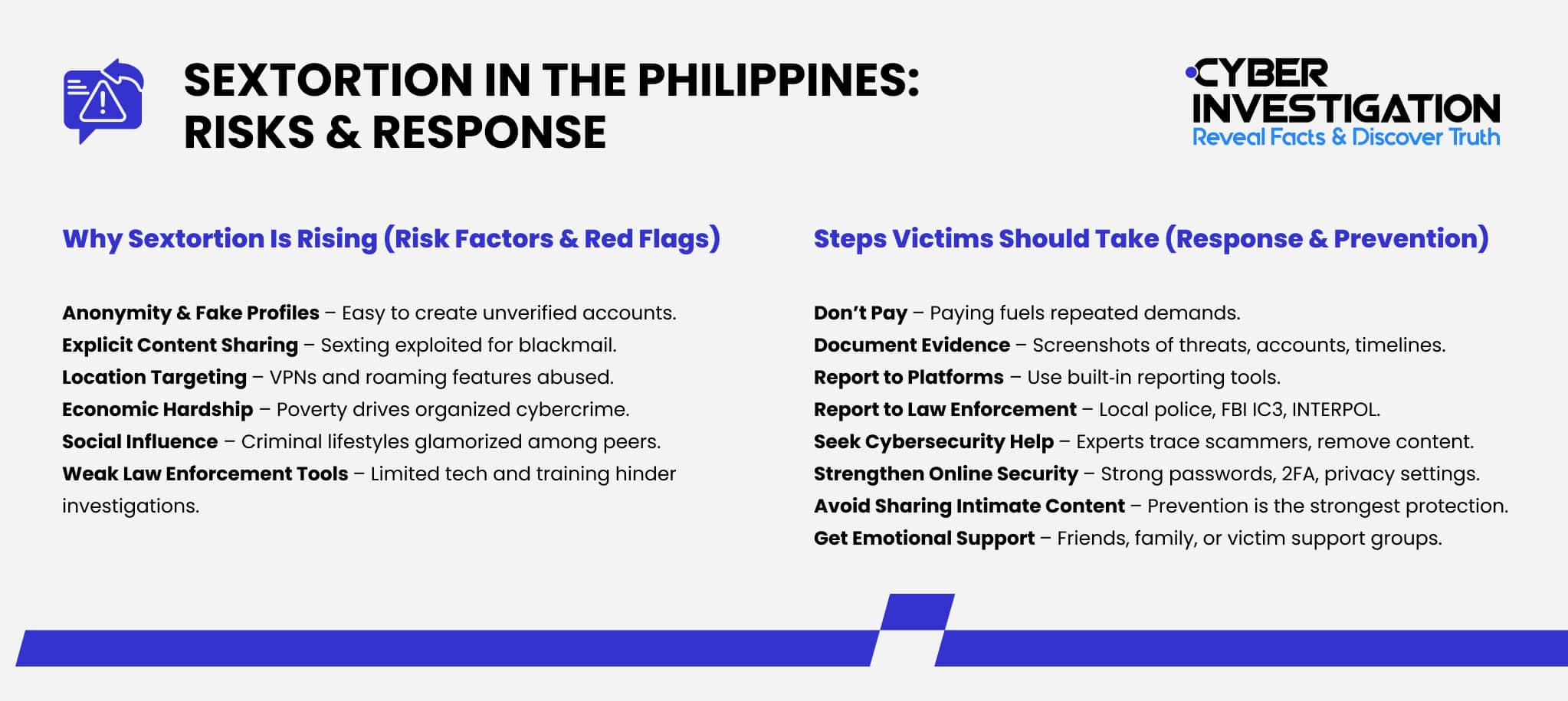Sextortion has become a global crisis that has affected millions of lives. The perpetrators of this crime can carry out their schemes from almost any country. However, the Philippines is one of the more popular countries that sextortionists operate out of. The Philippine National Police Anti-Cybercrime Group (PNG-ACG) reported that cybercrimes surged in the country by over 68% in 2023, and that number is expected to continue rising. But how did things get to this point? What’s driving the surge? The good news is you can continue reading to get the answers to all of this and more.
The Threat of Sextortion Across the Philippines
It was reported that more than 97 million people in the Philippines regularly used the internet. However, some individuals also weaponize it for malicious purposes. In 2014, INTERPOL launched an operation to target organized crime groups and sextortion networks around the world. The operation led to the identification of over 190 individuals that belonged to organized cybercrime networks in the Philippines.
“The scale of these sextortion networks is massive and run with just one goal in mind: to make money regardless of the terrible emotional damage they inflict on their victims,” said Sanjay Virmani, the Director of INTERPOL’s Digital Crime Centre.
While INTERPOL uncovered organized sextortion networks operating out of the Philippines, this is still only a small sample of the widespread issue of sextortion. The real scale of these crimes is underestimated as sextortion is often not reported. The progression of technology, a lack of reporting, and economic hardship are all factors that contribute to the perpetuation of sextortion in the Philippines.


The Role Poverty Plays
Economic hardship is a primary factor that drives cybercrime. A challenging job market can make it difficult to make ends meet. In fact, 17 million Philippine residents were living in poverty in 2024, according to Reuters. Many individuals turn to cybercrime, particularly financial sextortion, as a source of income in the face of a strained economy.
Nigeria faces similar economic struggles and is also a hotspot for sextortion activity. A study by the University of Lagos examined the rise of organized cybercrime networks and the individuals that participated in them. The Yahoo Boys are a crime organization in Nigeria that is well known for their sextortion schemes, and they typically target young people in English-speaking countries. In the study, it was revealed that low job security, economic hardship, and ease of access to technology were some of the main factors driving individuals to join The Yahoo Boys.
Social Influences
Another factor driving sextortion and other cybercrimes is the societal glorification of those who perpetrate them. In the study, many Yahoo Boys were young college students or graduates who were desperate for a source of income. These young individuals saw their peers living a lavish lifestyle and desired to live similarly. Peers involved with cybercrime have the ability to attract friends and acquaintances to their lifestyle, leading to the growth of cybercrime organizations. These factors work similarly in the Philippines and contribute to the rise of blackmail activity in the country.
The Obstacles Facing Law Enforcement in the Fight Against Sextortion
With the surge in sextortion, Philippine law enforcement is expected to combat the cybercrime. INTERPOL has been able to discover and take action against organized sextortion syndicates in the country. In fact, INTERPOL included the Philippines in their largest-ever operation against human trafficking and smuggling in 2024. In the report, officers raided a warehouse where more than 250 people were conducting romance scams with industrial-level organization.
While INTERPOL has made progress in fighting cybercrime in the Philippines, far more work needs to be done at the local level. However, there are obstacles that have prevented the local authorities from cracking down on sextortion effectively.
How Limited Technology Affects the Fight Against Sextortion
The tactics of cybercriminals have evolved alongside technology. Instead of Nigerian Prince emails, we are now dealing with sophisticated catfishing schemes and malicious online profiles indistinguishable from authentic ones. It takes advanced forensic tools to uncover digital evidence and trace the online footprint of perpetrators.
De La Salle University conducted a study and found that the PNP-ACG has access to hardware and software that can be used for digital investigations. However, the tools are not typically adequate to investigate every cybercrime. The study also concluded that the PNP-ACG could use better training to properly educate law enforcement officers on how to use digital investigation tools and methods effectively.
Furthermore, Philippine law enforcement may not only fail to possess the correct resources for fighting cybercrime — they also may not have the human capital. According to a survey from an IT company in Singapore, the Philippines faces an extreme shortage of individuals with cybersecurity expertise. This lack of talent directly limits the country’s ability to combat sextortion and other cybercrimes as well.
Real-World Examples of Sextortion in the Philippines
Philippine sextortionists may see their scams as a quick way to make money. However, the consequences are extremely real for their victims. Even the threat of sextortion can cause severe emotional distress, disrupting entire lives and traumatizing victims. When discussing sextortion, it’s always important to highlight the victims’ experiences and the profound harm this cybercrime can cause.
Illinois State Senator Threatened with Sextortion
In 2016, Illinois State Senator Ron Sandack was messaging a woman on Facebook. It was a friendly conversation and eventually the two connected on Skype. They had a video call and although the details were not disclosed, the woman used the video to blackmail the senator. She threatened to share the video call to all his Facebook friends unless he sent her $2,500. Sandack decided to pay the woman to protect his career, and he wired the payment to the Philippine islands. On July 24th, 2016, Sandack resigned as senator and cited “cybersecurity issues” as the reason.
The Case of Daniel Perry
In 2013, Daniel Perry was only 17 when he was messaging a girl his own age via Skype. The teenager from Dunfermline was then lured into a video call. After the video chat turned sexual, the criminals dropped the façade and revealed that they secretly recorded the entire call. The blackmailers threatened to expose the video publicly unless Daniel paid them a certain amount of money. Daniel couldn’t meet their demands and begged them to leave him alone.
However, the gang of criminals intensified their threats with encouragement for the teenager to harm himself. Unfortunately, the situation overwhelmed Daniel completely, and in July 2013, he decided to take his own life. INTERPOL worked with Scottish police officers and the BBC team to track the digital footprint of the perpetrators responsible. They traced the data trail to three men in the Philippines. The men denied having any involvement in the crime, but in May 2014, they were arrested for the crime.
Fighting Sextortion Demands a Global Response
The advancement of technology has opened the door for global communication. While this has many benefits, it also has various downsides. Sextortion, in particular, has become an international emergency, with law enforcement agencies doing their part in combating sextortion and targeting organized cybercrime syndicates. However, there is a long way to go. Crime networks are not the only culprits for sextortion. Individuals are also committing the crime independently of a network. In a connected world, fighting sextortion requires a united response — starting with spreading public awareness and education.







